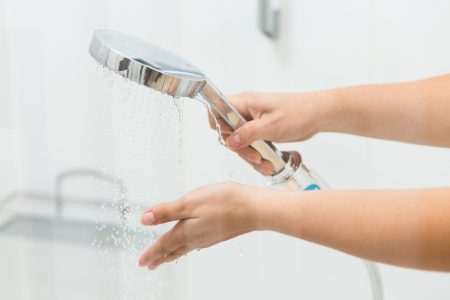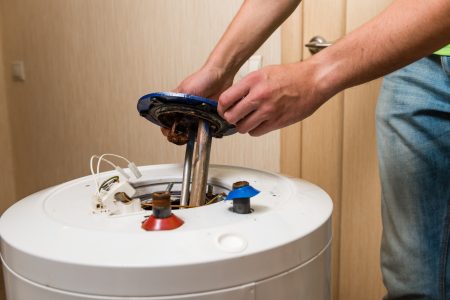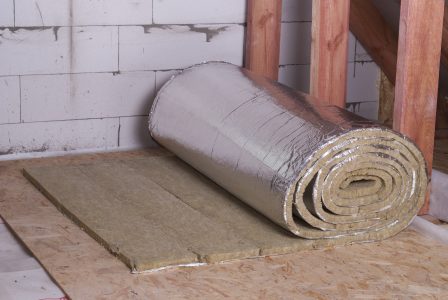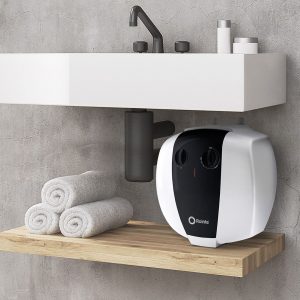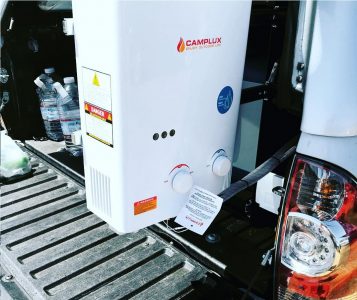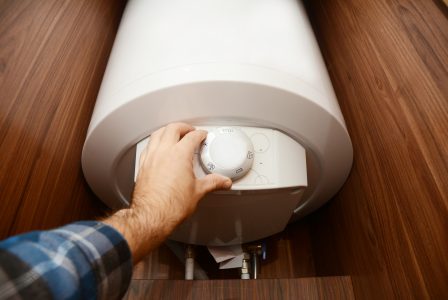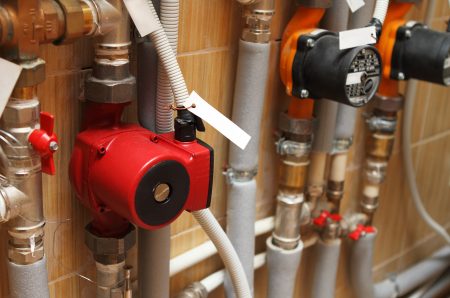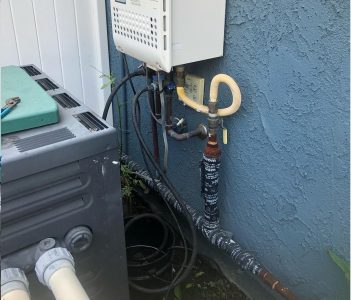We have probably all been frustrated by cold water when turning on a hot tap after a long shower. This might be because it’s cold outside, due to a fault with your water heater, or it could simply be that your hot water tank has been emptied.
Depending on the reason for your water running cold, there are different solutions. You might need a replacement heater, an additional boiler, or simply to flush your heating system.
How long does it take a water heater to heat up? In this article, we will take a closer look at the reasons why it takes time for your water to heat up and the various methods for addressing a slow boiler.
Key Takeaways
- Heating time depends on water heater type: Gas heaters take 30-70 minutes, electric heaters take 70-120 minutes, and tankless heaters take less than a minute.
- Factors influencing heating time include the first-hour rating, water heater size, inlet water temperature, and fuel type.
- Sediment buildup in the tank can cause longer heating times. Flushing the tank regularly can help prevent this issue.
- If heating time suddenly increases, check for sediment buildup, troubleshoot heating elements or thermostat, or consider upgrading to a larger or tankless water heater.
How Long Does a Water Heater Take to Heat Up?
When it comes to water heaters, there is a huge variety of sizes, types, and fuel/power sources. All of these variables influence how long it takes the water heater to heat up the water.
Gas Water Heaters
One of the major benefits is low energy bills. Instead of using electric elements, they heat the water using gas burners at the bottom of the tank. This makes their recovery time significantly faster.
The average gas water heater doesn’t take long to heat a full tank, though this depends on its size. A 40-gallon tank will take between 30 and 40 minutes whereas an 80-gallon tank will take 60 to 70 minutes.
Electric Water Heaters
Electric water heaters are generally less efficient. They use electric heating elements inside the tank, similar to those in a toaster or an oven. Their recovery time is a bit longer than gas-fueled units.
While there are small 20-gallon and 30-gallon tanks, these are unlikely to be enough to supply your entire home. With a 50-gallon tank, you can expect hot water within 70 to 90 minutes. For an 80-gallon tank, you should have hot water in about two hours.
Solar Water Heaters
Solar water heaters take their power directly from the sun (1). However, as we can’t always rely on sunny weather, they are usually backed up by a standard electric water heater. This means they take about the same amount of time as an electric unit.
There are solar units available that rely solely on solar power. After installation of one of these units, you can expect a long waiting time on cloudy days. You might have no hot water at all on particularly gloomy days, or during the winter.
Heat Pump Water Heaters
Heat pump water heaters are often called “hybrids” as they are modified electric water heaters. Rather than generating direct heat, they use the incoming electricity to spread heat, thus increasing their efficiency (2).
Heat pump units are usually high-tech, offering several different energy-saving settings. These typically include hybrid and high-demand modes. In hybrid mode, the unit uses less energy, but this does increase the heating time.
When in hybrid mode, the waiting time for hot water can be up to two hours, depending on the tank size. However, if you switch to high-demand, the electric part of the unit will kick in and decrease the waiting time to about 60 to 80 minutes.
Tankless Water Heaters
If you are looking for a water heater with little or no waiting time, a tankless unit is perfect. Tankless or on-demand water heaters are active only when you need them. They don’t have a tank, which means the water enters on demand, receiving heat as it circulates (3).
There are different sizes available, and most are meant as point-of-use units. Regardless of the size, the average waiting time is less than a minute.
Factors That Influence Heating Time
The expected waiting time is only an estimate. Water heaters are affected by various factors that influence how long they take to heat up. Some are universal across the different types, while others are more specific.
1. First Hour Rating
The first-hour rating tells you the number of gallons the water heater can deliver within the first hour. It illustrates the ability of the water heater to heat an entire tank to the desired temperature (4).
A high first-hour rating means a shorter waiting time. The given number depends on the fuel source, tank capacity, and the size of the heating elements or burners (5).
2. Size of Water Heater
The size of your water heater is another factor that can shorten or prolong the heating time. As mentioned earlier, a larger tank takes longer to heat up. This is simply because there’s more water to heat.
Larger tanks will generally have two heating elements or a large burner to speed up the heating time. Still, a smaller tank will heat up more quickly.
On the other hand, a smaller tank will run out faster than a larger tank. You will have hot water sooner but you are also more likely to run out of it during even minor tasks.
3. Inlet Water Temperature
The inlet water temperature, or temperature rise, is another factor that can significantly influence the recovery time. Depending on where you live, the inlet water will be at different temperatures. It is generally colder up North than in the South.
When we say “temperature rise,” we refer to the difference between the incoming water and the preset temperature on the boiler. The colder the inlet water, the longer it takes to heat up.
4. Fuel Type
The fuel type makes a big difference to recovery time. Gas water heaters are a lot faster at heating water than their electric cousins. This is because gas burners reach a much higher temperature than electric heating elements.
Why Is It Suddenly Taking Longer?
In time, your water heater will likely take longer to heat up. If you think it is happening prematurely, check the following:
1. Sediment Buildup
The likeliest reason that your water heater is suddenly taking longer to heat up is sediment buildup. This is a common issue that occurs as your unit ages. If you have hard inlet water or neglect your heater’s maintenance, it could happen earlier.
Sediment buildup occurs when the minerals present in the water begin to settle on the inside of the tank. This can occur even with soft water that’s low in minerals but it will usually take longer to become noticeable.
Sediment buildup consists of dissolved minerals such as magnesium and calcium. These sit on the walls of the tank and the heating elements where they can seriously impede the unit’s ability to heat water.
There are three main signs of a buildup:
- The unit takes longer to heat up and runs out of hot water more quickly.
- The unit makes strange noises such as popping, knocking, or hissing.
- Significantly higher energy bills.
The best way to prevent this issue is by flushing the tank regularly. If you have an electric unit and the heating elements are damaged beyond repair, you will need to replace them.
2. Troubleshooting
If sediment buildup isn’t the issue, the heating elements or thermostat might need some troubleshooting. This is a fairly easy process for an electric unit but, if you have a gas heater, you will need some experience. This is also why we recommend contacting a professional.
If your unit is electric, here’s a brief explanation of how to troubleshoot it:
- Turn off the power: Turn the breaker to the “Off” position before you handle any electrical components.
- Access the thermostat: Remove the access panel using a screwdriver. Pull out the insulation to expose the upper thermostat.
- Check the power: Use a multimeter and check the wires for signs of voltage. They should all display a reading of zero before you continue.
- Adjust the temperature: Use a flat-blade screwdriver and turn the arrow indicating the temperature. Try decreasing the temperature by a few degrees.
- Finish up: Replace the insulation and access panel. Once everything is ready, turn on the breaker to restore your water heater’s power.
If the recovery time is still too slow after reset, you might need to replace the heating elements. It’s also possible that your water heater simply isn’t large enough for your hot water needs.
FAQs
Wrap Up
How long it takes a water heater to warm up your water supply depends on a few factors. As a general rule, gas units are significantly quicker than electric ones.
Whatever your circumstances, sometimes the recovery time suddenly increases which could be a sign of sediment buildup. In this case, flush the tank, or call a professional for help with a replacement.
We all want to be able to enjoy hot water as quickly as possible. By maintaining your water heater, or upgrading it if necessary, you should be able to do exactly that.
